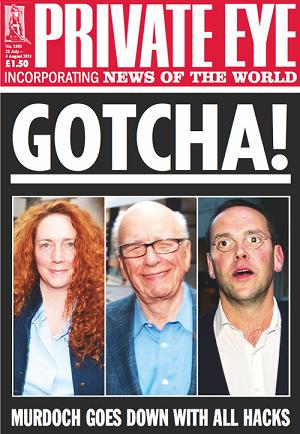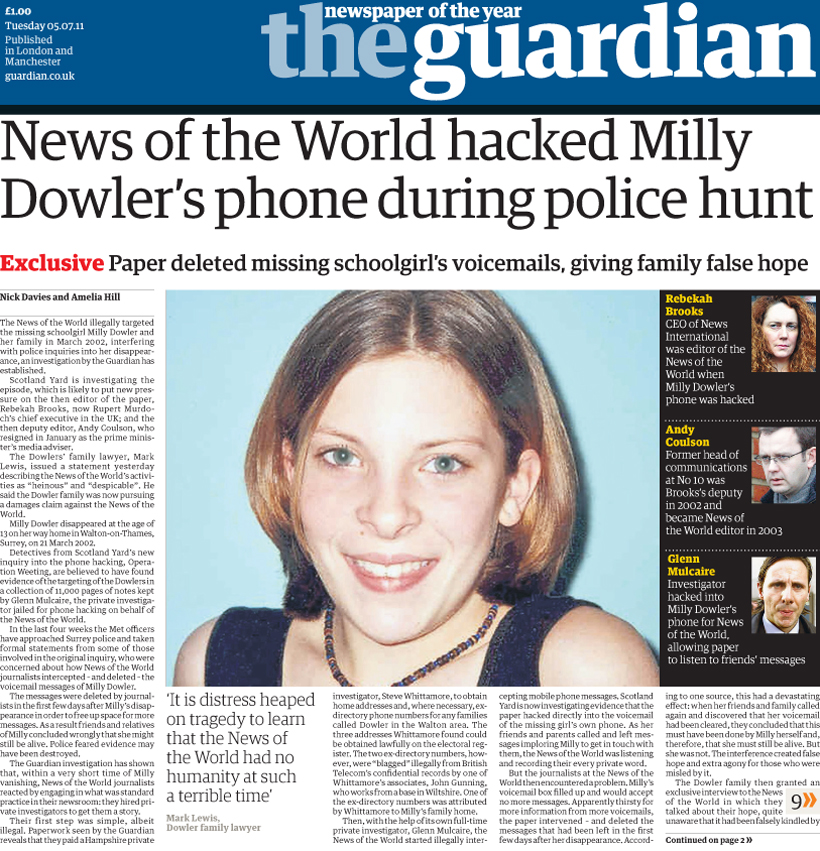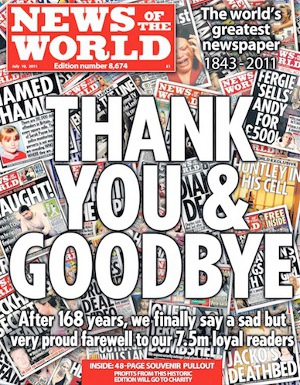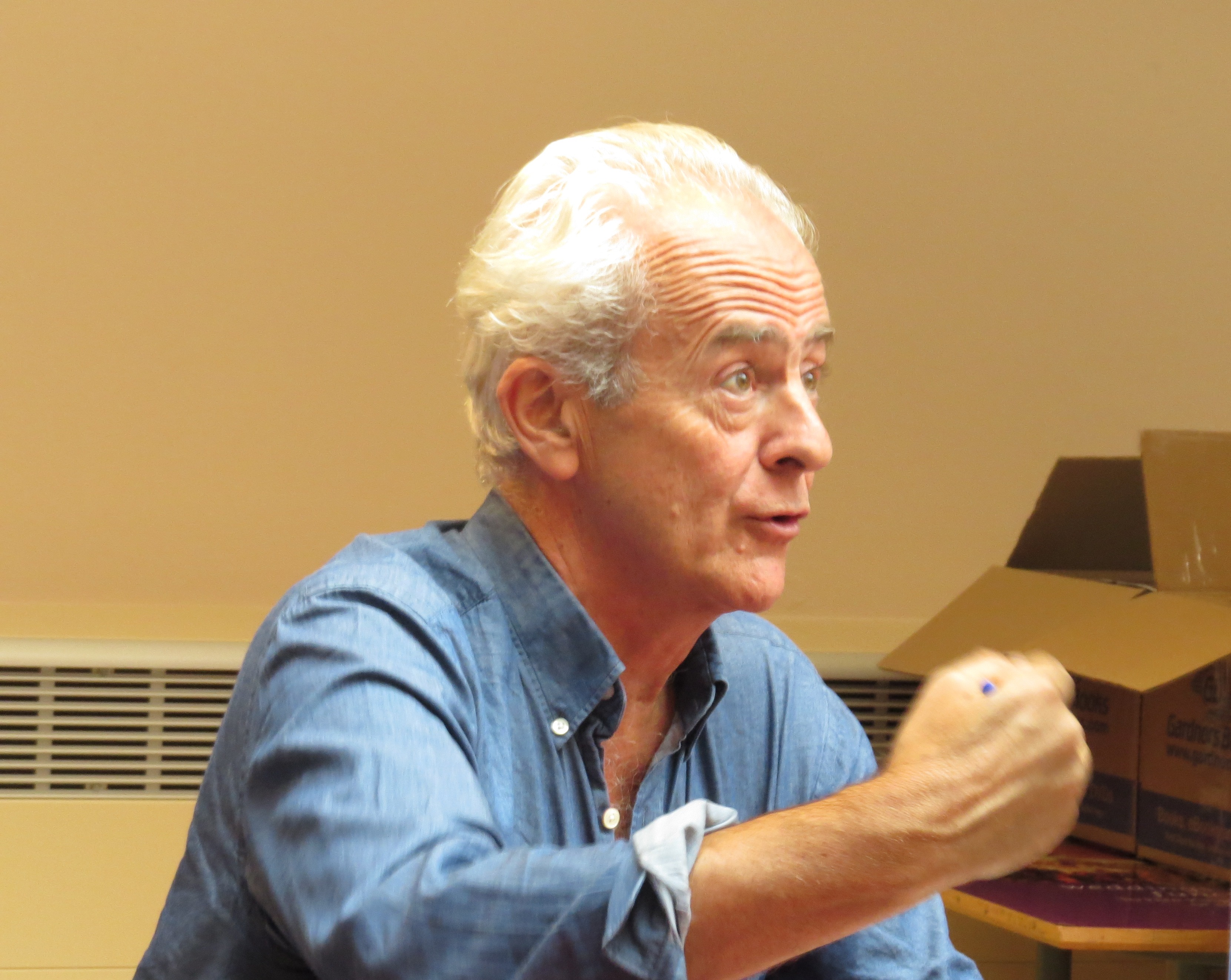
Skulduggery and deceit – Nick Davies appeared at Ilkley Literature Festival and lifted the lid on Murdoch and the News Of The World, exposing aggression and megalomania – Rob Walsh gives a fascinating glimpse into the world of a manipulative media baron, with an unexpected appearance from an ex-con News Of The World journalist …
Near the beginning of Nick Davies appearance to promote his book Hack Attack: How The Truth Caught Up With Rupert Murdoch, there was an instructive moment, one of many in the 75 fascinating and appalling minutes Davies was onstage. Fascinating because he’s a warm and affable storyteller with a great tale, appalling because of the stories he had to tell of corruption, megalomania and persecution.
The moment came when Davies was asked – what drives investigative journalists to do what they do, to beaver away at stories no one else is touching? Davies has investigated this – well, he would wouldn’t he? – and thinks many investigative journos are slightly cracked, trying to right wrongs that hark back to incidents in their own lives. He himself suffered what he described as an extraordinary level of violent abuse as a child, and later realised that in his journalism he was trying to protect people from abuses of power, particularly children and those who couldn’t protect themselves. A line of work which eventually led him to pit himself against Rupert Murdoch, perhaps the most powerful man in the world, and then worry that he might be rather out of his depth…
The story, as I suggested last time I wrote about this, is an epic and extremely convoluted one, an epic still evolving as new evidence comes to light. Investigations and court cases are pending or in process, and there was clearly much that couldn’t be said in public at Kings Hall. The ILF interviewer described the book as ‘..almost reads like Raymond Chandler’, and it’s not hard to see the parallels – layers of skulduggery and deceit, with dirty deeds in dark shabby corners. Later, during audience questions from an ex-News Of The World journo who had been jailed for hacking, the interviewer said the event was ‘..turning into a soap opera’, with good reason.
One recurring theme in Nick’s talk was the aggressive behaviour of Murdoch, his papers and his staff, and how this aggression repeatedly backfired. Murdoch and his empire create a climate of fear, like the school bully who beats up two or three kids, and then everyone else tiptoes round him. Similarly, in the decades after Murdoch bought up the News Of The World and the Sun in the late 1960s and gradually took them downmarket, tapping phone calls and trashing reputations, it became clear to those in the public eye, to politicos and the police, that – unless they fell into line – they too would have their personal lives hauled out to face public humiliation, personal pain and loss of their reputations and jobs. Falling into line became the default position.
Other media have followed Murdoch’s downward trajectory in order to keep their readers and viewers, evolving into a remorseless tabloid culture.

For Davies, this is all about power – Murdoch doesn’t need more money, what he wants is behind-the-scenes influence over governments, to align them with his own politics, and he uses his media empire to bludgeon them – and everyone else – into line.
But to go back to the aggressive tactics used, and how they backfired – when Davies and the Guardian published their first story on phone hacking the police rubbished the initial story, saying there were only eight victims. At this point they had information on 5,500 hacking victims in their possession, as detailed in the notebooks of private investigator, Glenn Mulcaire. They failed to use this evidence – they fell into line. This was followed by Rebecca Brooks of NOTW saying Davies was a rogue reporter and that the Guardian had misled the British public.
Glen Mulcaire, working for the NOTW, had hacked into the phone of, as Davies said, ‘one of the very few people with more power and prestige than Rupert Murdoch – Prince William’ and the Palace complained. Mulcaire’s paperwork was seized, listing all 5,500 hacking victims.
Davies had only expected to spend a couple of week on the story, but when the police and Brooks put his journalistic credibility and the reputation of his editor at stake, he was pulled back in and had to follow it up. So the story continued – because of the heavy-handed tactics used to squash it.
Again, during a BBC Radio 4 Today radio interview with Davies and Stuart Kuttner, managing editor of NOTW, Kuttner rubbished Nick so scornfully that it provoked a mole who had heard the interview, knew the truth, and thought NOTW shouldn’t be allowed to get away with it. He supplied Davies with detailed information and guided him through the story. The aggression blew back, again.
That mole’s trail led to the ‘email for Neville’ – the subject line of an email to Neville Thurlbeck, chief reporter of the NOTW. This email listed the text of 45 voicemail messages hacked from NOTW victims, and was clear proof of what was happening, but Davies and the Guardian were at first not allowed to publish details as it would have exposed sources.
Then the NOTW put pressure on friendly MPs, and Davies and his editor Alan Rusbridger were hauled before the Commons media select committee at very short notice – both very afraid they wouldn’t be able to prove what they knew because the ‘email for Neville’ couldn’t be produced and their careers would be over.
Again, aggression backfired. At this point Rebekah Brooks put out the statement saying Davies and the Guardian were misleading the British people. This caused the sources for the ‘email to Neville’ to review their position and decide that enough time had elapsed, the email had been seen by enough people, and it could be used as evidence. So, Davies and his family spent the afternoon before his appearance in front of the Commons committee afternoon sitting round the kitchen table blacking out the names of the people in the email who had been hacked, so he couldn’t be accused of the same reputational damage as NOTW.
As evidence of Murdoch’s power to influence government Davies claims that the impact of Murdoch and the political editor of the Sun Trevor Kavanagh was ‘decisive’ on the privatisation of the NHS, and that the pressure caused Gordon Brown to abandon his belief in a publicly-funded health service. Whether NHS privatisation is right or wrong, it is clearly wrong that a global media organisation should bully the UK Prime Minister into such a decision.
Davies pointed out that a journalist can never know all the consequences when opening up a can of worms like this, and he was appalled at the closing of the NOTW. This put 200 people out of work just so that Murdoch could try to recover his reputation and finalise a deal to take over BSkyB. That deal would have made him even more powerful, and Davies describes the NOTW closure as epitomising the cruelty of Murdoch’s regime.

Davies feels fully vindicated by the results of the hacking trial, but disappointed by the longer term outcome. National newspapers have stopped committing crimes – for the moment. And that’s about it.
The Press Complaints Commission rubbished the story when – ideally – they were the very body that should have been dealing with it. Davies described the PCC as intellectually corrupt, and far from independent of the media they were supposed to be regulating. He thinks the new body, IPSO, has similar flaws – far too cosy with the people they are supposed to oversee.
So, there’s still no effective press regulation that could stop this happening again, and the police have clamped down heavily on whistleblowers in their own ranks. Murdoch is still playing the kingmaker, and Davies believes that we will see more interference from him in the run up to the general election next year. The book makes the point that no UK government since 1979 has been elected without the approval of an Australian with a US passport – Rupert Murdoch.
Then we had questions from the floor. At this point Davies spotted Glen Miskiw in the audience. Miskiw is an ex-NOTW journo who had been sent to prison for 6 months after being convicted of hacking – the hacking that Davies had exposed. Miskiw had several detailed and rather scurrilous points to make – which I can’t repeat for legal reasons – but failed to back them up. It was rather like a pantomime villain making an appearance to shout ‘No, we didn’t!’
It is possible Miskiw had gone – or been sent – to Ilkley to trap Davies into saying something that lawyers could use. He appeared to be trying. This is that kind of story. Just when you think something is implausible, unlikely, absurd – then you find out it’s real. Davies rebutted the points in detail, where he was able, dealing calmly with Miskiw and praising him for having the balls to come along.

For me, the event could have gone on for much longer – this is an epic and ongoing story, an epic that could affect us all. Davies was on top of the very complex levels of detail, with dates and facts at his fingertips. He may have restored my faith in the possibilities of journalism, seriously damaged by Murdoch and his malign influence.
George Clooney is directing a film based on the book, and while films rarely ‘get’ the book they’re based on, Davies believes Clooney’s track record in making his own choice of films – Ides Of March, and Good Night And Good Luck, for example – shows his good intentions and his desire to expose the truth behind power.
It’s juvenile to believe in heroes but I’m sure many of the audience left buzzing with admiration for Davies and his work, and the Kings Hall staff I met were energised and excited by what they’d heard.
Walking down the street afterwards I wanted to grab people by the lapels to say ‘This is important stuff, you should have been there!’.